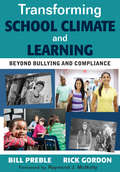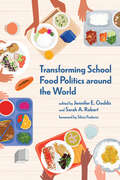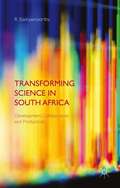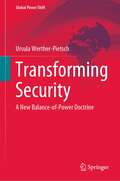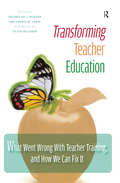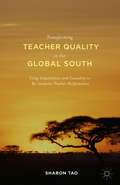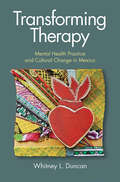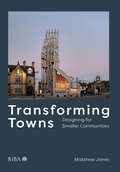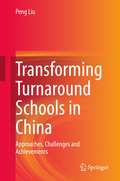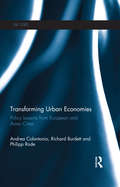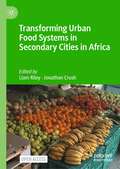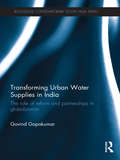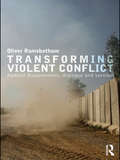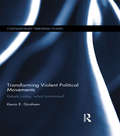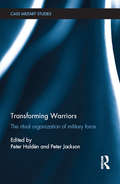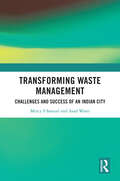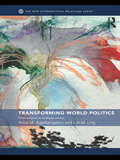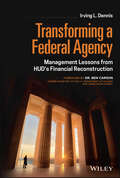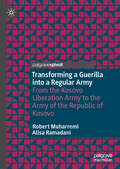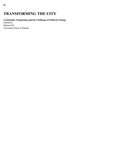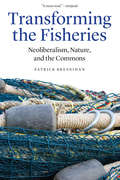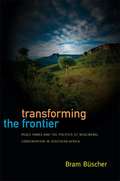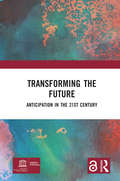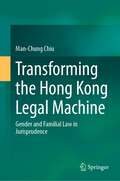- Table View
- List View
Transforming School Climate and Learning: Beyond Bullying and Compliance
by William K. Preble Rick M. GordonCreating safe schools from the inside out This book details a comprehensive process for empowering students and teachers as school improvement leaders and “experts.” Bill Preble and Rick Gordon explain how schools can use the SafeMeasures™ collaborative action research process to: Collect and analyze school climate data Develop improvement goals Create exciting and inspiring action plans to dramatically improve their school’s climate and student engagement Each chapter features success stories from real schools, strategies and implementation activities, and book study questions that help all stakeholders transform both their school climate and student learning.
Transforming School Food Politics around the World (Food, Health, and the Environment)
by Jennifer E. Gaddis and Sarah A. RobertHow to successfully challenge and transform public school-food programs to emphasize care, justice, and sustainability, with insights from eight countries across the Global North and South.School food programs are about more than just feeding kids. They are a form of community care and a policy tool for advancing education, health, justice, food sovereignty, and sustainability. Transforming School Food Politics around the World illustrates how everyday people from a diverse range of global contexts have successfully challenged and changed programs that fall short of these ideals. Editors Jennifer Gaddis and Sarah A. Robert highlight the importance of global and local struggles to argue that the transformative potential of school food hinges on valuing the gendered labor that goes into caring for, feeding, and educating children.Through accessible and inspiring essays, Transforming School Food Politics around the World shows politics in action. Chapter contributors include youths, mothers, teachers, farmers, school nutrition workers, academics, lobbyists, policymakers, state employees, nonprofit staff, and social movement activists. Drawing from historical and contemporary research, personal experiences, and collaborations with community partners, they provide readers with innovative strategies that can be used in their own efforts to change school food policy and systems. Ultimately, this volume sets the stage to reimagine school food as part of the infrastructure of daily life, arguing that it can and should be at the vanguard of building a new economy rooted in care for people and the environment.Contributors:Alexis Agliano Sanborn, Lisa Altmann, José Arimatea Barros Bezerra, Islandia Bezerra, Jennifer Black, Brooks Bowden, Christine C. Caruso, Cristiane Coradin, Rebecca Davis, Sinikka Elliott, Rachel Engler-Stringer, Debbie Field, Lucy Flores, Andrée Gacoin, Jennifer Gaddis, Michelle Gautreaux, Anne Hales, Karin Hjälmeskog, Anore Horton, Kristiina Janhonen, Jennifer LeBarre, Raven Lewis, Faye Mack, Marjaana Manninen, Brent Mansfield, Anne Moertel, Katsura Omori, Prerna Rana, Margaret Read, Emmanuelle Ricaud Oneto, Sarah A. Robert, Betsy Rosenbluth, Amy Rosenthal, Ludmir dos Santos Gomes, Sônia Fátima Schwendler, Amy Shollenberger, Courtney Smith, Seulgi Son, Jarrett Stein
Transforming Science in South Africa
by R. SooryamoorthyThis book is essential for anyone interested in knowing how science works nationally and internationally in the contemporary world. It offers a comprehensive analysis of scientific collaboration and its relation to development and the productivity of scientists, with specific reference to South Africa in both the past and the present.
Transforming Security: A New Balance-of-Power Doctrine (Global Power Shift)
by Ursula Werther-PietschThis book analyses the collective security system as it now stands, focusing on strategic and normative frameworks. The old system of international collective security is based on assumptions that are inadequate in relation to current challenges. Against the backdrop of changed geopolitical constellations, democracies under siege and the challenges posed by new types of warfare, critical analysts hold that not a single multilateral institution today is fully up to the task it was created for. The UN, from its founding to the Sustained Peace Approach, represents a fascinating global process of vision-building and adaptation to reality. Based on this understanding, the dynamics of the UN peace and security architecture are examined along with major agendas, from peacebuilding to development. In turn, reform proposals in the post-COVID-19 era are discussed. The book examines whether a regionalization of security structures within the UN framework may offer a way out of global fragility and growing instability factors, a question of utmost importance for conflict prevention and crisis management in the next few decades. In turn, the author discusses a normative positioning of a new intervention logic as the lowest common denominator between collaborative regional orders. Reinvented multilateralism will return as a “must.” Given its scope, the book will appeal to students and scholars of international relations and international security studies, as well as to policymakers in governments and international organizations.
Transforming Teacher Education: What Went Wrong with Teacher Training, and How We Can Fix It
by Chance W. Lewis Valerie Hill-JacksonExtracts from the text:"Why are fifteen million children and youth in poverty not achieving when we know that low-income students excel in the classrooms of “star” teachers (who comprise approximately 8 percent of the teaching force)?" "Whose needs or interests are being met in education reform today?" “In my own institution, there has not been a systematic assessment of the effectiveness of the basic teacher education program since the institution was founded over a century ago as a teachers college. Imagine, not one ever!”"Teachers who empathize with students and the life challenges they face soon realize that the dysfunctional bureaucracies will not permit them to meet the needs of their students. Half of the starry-eyed beginners are gone in five years or less." "Why does teacher education focus on the managerial, instrumental or delivery system aspects of the profession?""The expert advice dispensed by schools of education regarding what future teachers should do is not connected to any theory of learning, or to any reality of life in school classrooms." "Why has the recruitment process resulted in a cohort of teachers who are unable to connect with their students?""Does a qualified teacher equate to a quality teacher?""The best hope of getting more effective teachers from university teacher preparation programs is to base their budgets on the number of their graduates who serve in challenging schools and their effectiveness with children and youth. At the district level, the salaries of hiring officials should be based on how well these officials identify and retain quality teachers."In this book, 12 distinguished scholars provide a hard-hitting, thoroughly researched, historical and theoretical critique of our schools of education, and offer clear recommendations on what must be done to ensure all children can achieve their potential, and contribute to a vibrant, democratic society.
Transforming Teacher Quality in the Global South: Using Capabilities and Causality to Re-examine Teacher Performance
by Sharon TaoA common story of teachers from the Global South portrays them as deficient, unreliable and unprofessional. However, this book uses an innovative Capability Approach/Critical Realist lens to reveal the causal links between teachers' constrained capabilities and their 'criticised' behaviours and offer nuanced, creative strategies for improvements.
Transforming Therapy: Mental Health Practice and Cultural Change in Mexico
by Whitney L. DuncanOaxaca is known for many things—its indigenous groups, archaeological sites, crafts, and textiles—but not for mental health care. When one talks with Oaxacans about mental health, most say it's a taboo topic and that people there think you "have to be crazy to go to a psychologist." Yet throughout Oaxaca are signs advertising the services of psicólogos; there are prominent conferences of mental health professionals; and self-help groups like Neurotics Anonymous thrive, where participants rise to say, "Hola, mi nombre es Raquel, y soy neurótica."How does one explain the recent growth of Euroamerican-style therapies in the region? Author Whitney L. Duncan analyzes this phenomenon of "psy-globalization" and develops a rich ethnography of its effects on Oaxacans' understandings of themselves and their emotions, ultimately showing how globalizing forms of care are transformative for and transformed by the local context. She also delves into the mental health impacts of migration from Mexico to the United States, both for migrants who return and for the family members they leave behind.This book is a recipient of the Norman L. and Roselea J. Goldberg Prize from Vanderbilt University Press for the best book in the area of medicine.
Transforming Therapy: Mental Health Practice and Cultural Change in Mexico
by Whitney L. DuncanOaxaca is known for many things--its indigenous groups, archaeological sites, crafts, and textiles--but not for mental health care. When one talks with Oaxacans about mental health, most say it's a taboo topic and that people there think you "have to be crazy to go to a psychologist." Yet throughout Oaxaca are signs advertising the services of psicólogos; there are prominent conferences of mental health professionals; and self-help groups like Neurotics Anonymous thrive, where participants rise to say, "Hola, mi nombre es Raquel, y soy neurótica." How does one explain the recent growth of Euroamerican-style therapies in the region? Author Whitney L. Duncan analyzes this phenomenon of "psy-globalization" and develops a rich ethnography of its effects on Oaxacans' understandings of themselves and their emotions, ultimately showing how globalizing forms of care are transformative for and transformed by the local context. She also delves into the mental health impacts of migration from Mexico to the United States, both for migrants who return and for the family members they leave behind.This book is a recipient of the Norman L. and Roselea J. Goldberg Prize from Vanderbilt University Press for the best book in the area of medicine.
Transforming Towns: Designing for Smaller Communities
by Matthew JonesTowns have undergone dramatic and rapid change over the last century. Declining historic cores are surrounded by sprawling low-density housing, industrial and retail estates. The character and sense of place at the heart of rural towns and villages is under threat. By drawing people away from town centres, these developments erode the sense of community and public life. This book demonstrates how contemporary architecture, community engagement and thoughtful urban design can contribute to the creation of thriving small communities. It addresses a lack of inspiration and ideas for architects and designers working in small communities and promotes a character-based approach to designing and planning 21st century towns.
Transforming Turnaround Schools in China: Approaches, Challenges and Achievements
by Peng LiuThis book provides a holistic picture of how Chinese turnaround schools have been remarkably improved over the years and to arouse further discussion in this regard. It contributes to the understanding of school improvement from a Chinese cultural perspective, solidifies the knowledge basis of school change theories, and expands the understanding of educational administration and policies in China.
Transforming Urban Economies: Policy Lessons from European and Asian Cities (LSE Cities)
by Andrea Colantonio Philipp Rode Richard BurdettCities house the majority of the world’s population and are the dynamic centres of 21st century life, at the heart of economic, social and environmental change. They are still beset by difficult problems but often demonstrate resilience in the face of regional and national economic decline. Faced by the combined threats of globalisation and world recession, cities and their metropolitan regions have had to fight hard to maintain their global competitiveness and protect the quality of life of urban residents Transforming Urban Economies: Policy Lessons from European and Asian Cities, the first in an ongoing series of research volumes by LSE Cities, provides insights in how cities can respond positively to these challenges. The fine-grained and authoritative analysis of how Barcelona, Turin, Munich and Seoul have been transformed in the last 20 years examines comparative patterns of decline, adaptation and recovery of cities that have successfully managed to transform their economies in the face of economic hardship. This in-depth and practical analysis is aimed at urban leaders, designers, planners, policymakers and scholars who want to understand the dynamics of economic resilience while cities are still suffering from the aftershocks of the 2008 recession. The book highlights the importance of aligned and multi-level governance, the need for strategic public investments and the role of the private sector, universities and foundations in leading and guiding complex processes of urban recovery in an increasingly uncertain age.
Transforming Urban Food Systems in Secondary Cities in Africa
by Jonathan Crush Liam RileyCountries across Africa are rapidly transitioning from rural to urban societies. The UN projects that 60% of people living in Africa will be in urban areas by 2050, with the urban population on the continent tripling over the next 50 years. The challenge of building inclusive and sustainable cities in the context of rapid urbanization is arguably the critical development issue of the 21st Century and creating food secure cities is key to promoting health, prosperity, equity, and ecological sustainability. The expansion of Africa’s urban population is taking place largely in secondary cities: these are broadly defined as cities with fewer than half a million people that are not national political or economic centres. The implications of secondary urbanization have recently been described by the Cities Alliance as “a real knowledge gap”, requiring much additional research not least because it poses new intellectual challenges for academic researchers and governance challenges for policy-makers. International researchers coming from multiple points of view including food studies, urban studies, and sustainability studies, are starting to heed the call for further research into the implications for food security of rapidly growing secondary cities in Africa. This book will combine this research and feature comparable case studies, intersecting trends, and shed light on broad concepts including governance, sustainability, health, economic development, and inclusivity. This is an open access book.
Transforming Urban Water Supplies in India: The Role of Reform and Partnerships in Globalization (Routledge Contemporary South Asia Series)
by Govind GopakumarThe absence of water supply infrastructure is a critical issue that affects the sustainability of cities in the developing world and the quality of life of millions of people living in these cities. Urban India has probably the largest concentration of people in the world lacking safe access to these infrastructures. This book is a unique study of the politics of water supply infrastructures in three metropolitan cities in contemporary India – Bangalore, Chennai and Kochi. It examines the process of change in water supply infrastructure initiated by notable Public Private Partnership’s efforts in these three cities to reveal the complexity of state-society relations in India at multiple levels – at the state, city and neighbourhood levels. Using a comparative methodology, the book develops as understanding of the changes in the production of reform water policy in contemporary India and its reception at the sub-national (state) level. It goes on to examine the governance of regimes of water supply in Bangalore, Chennai and Kochi, and evaluates the role of the partnerships in reforming water supply. The book is a useful contribution to studies on Urban Development and South Asian Politics.
Transforming Violent Conflict: Radical Disagreement, Dialogue and Survival (Routledge Studies in Peace and Conflict Resolution)
by Oliver RamsbothamThis book investigates intractable conflicts and their main verbal manifestation - radical disagreement – and explores what can be done when conflict resolution fails. The book identifies agonistic dialogue - dialogue between enemies - as the key to linguistic intractability. It suggests how agonistic dialogue can best be studied, explored, understood and managed even in the most severe political conflicts when negotiation, mediation, problem solving, dialogue for mutual understanding, and discourse ethics are unsuccessful. This approach of viewing radical disagreement as the central topic of analysis and conflict management is a new innovation in this field, and also supplements and enhances existing communicative transformational techniques. It also has wider implications for cognate fields, such as applied ethics, democratic theory, cultural studies and the philosophy of difference. This book will be of great interest to students of conflict resolution, peace and conflict studies, ethnic conflict and International Relations in general. Oliver Ramsbotham is Emeritus Professor of Conflict Resolution at the University of Bradford, UK, Chair of the Oxford Research Group, President of the Conflict Research Society and co-author of Conflict Resolution in Contemporary Conflict.
Transforming Violent Political Movements: Rebels today, what tomorrow? (Contemporary Terrorism Studies)
by Kevin E. GrishamThis book explores the factors that influence violent rebellious political organisations to transform into other entities, such as political parties, criminal organisations and terrorist organisations. From the end of the Second World War until 1990, many events in the world centred on the bipolar struggle between the United States and the USSR. Although there were numerous civil wars occurring during the Cold War era, many of these conflicts went virtually unnoticed unless they were linked to the Cold War struggle for ideological dominance. In the aftermath of the fall of the Soviet Union, the number of intra-state conflicts was prevalent around the globe. Along with the occurrence of civil wars, a variety of violent political movements also developed. Examining cases from Latin America, Africa, Europe, and Asia, this book addresses how violent political movements transform during and after conflict into new types of organisations using the collective political violence transformative (CPVT) model. The study uses a combination of pre-existing literature from the fields of sociology and political science, archival research, and interviews with movement members (former and active) conducted by the author. In studying the Provisional IRA and Sinn Féin, the Spear of the Nation (MK) and the African National Congress (ANC), the Abu Sayyaf Group and the Revolutionary Armed Forces of Colombia (FARC-EP), Transforming Violent Political Movements paints a picture of organisations that have to respond to their environments to survive. This book will be of much interest to students of political violence, terrorism, war and conflict studies, security studies and IR.
Transforming Warriors: The Ritual Organization of Military Force (Cass Military Studies)
by Peter Jackson Peter HaldénThis volume offers an interdisciplinary study of how different cultures have sought to transform individuals into warriors. War changes people, however a less explored question is how different societies want people to change as they are turned into warriors. When societies go to war they recognize that a boundary is being crossed. The participants are expected to do things that are otherwise prohibited, or at least governed by different rules. This edited volume analyses how different cultures have conceptualized the transformations of an individual passing from a peacetime to a wartime existence to become an active warrior. Despite their differences, all societies grapple with the same question: how much of the individual’s peace-self should be and can be retained in the state of war? The book explores cases such as the Nordic berserkers, the Japanese samurai, and European knights, as well as modern soldiers in Germany, Liberia, and Sweden. It shows that archaic and modern societies are more similar than we usually think: both kinds of societies use myths, symbols, and rituals to create warriors. Thus, this volume seeks to redefine theories of modernization and secularization. It shows that military organizations need to take myths, symbols, and rituals seriously in order to create effective units. This book will be of much interest to students of military studies, war studies, sociology, religion, and international relations in general.
Transforming Waste Management: Challenges and Success of an Indian City
by Mercy S Samuel Asad WarsiWaste management has become a great challenge for cities and urban areas, especially in countries with a high population density. This book looks at the waste management apparatus of the city of Indore, India, to see how the city overhauled its waste management practices and strategies to become one of the cleanest cities in the country.The volume highlights the challenges that the city faced and its use of innovative business models, technology, and infrastructure as well as instituting sweeping policy and process changes to bring change. It examines the city’s successful efforts to bring informal waste management systems to the mainstream and other interventions to close the gaps between government institutions, sanitation workers, and the general public. It further throws light on the use of technological interventions that the city government adopted for streamlining waste management and developing a sustainable business model for waste and emission reduction leading to achieve carbon credits and net zero goals.This book will be of interest to students, teachers, and researchers of urban planning and management, urban sociology, urban geography, waste management, and environmental studies. It will also be useful to policymakers and professionals working in the field of city management planning and governance.
Transforming World Politics: From Empire to Multiple Worlds (New International Relations)
by Anna M. Agathangelou L.H.M. LingThis book provides a critical understanding of contemporary world politics by arguing that the neoliberal approach to international relations seduces many of us into investing our lives in projects of power and alienation. These projects offer few options for emancipation; consequently, many feel they have little choice but to retaliate against violence with more violence. The authors of this pioneering work articulate worldism as an alternative approach to world politics. It intertwines non-Western and Western traditions by drawing on Marxist, postcolonial, feminist and critical security approaches with Greek and Chinese theories of politics, broadly defined. The authors contend that contemporary world politics cannot be understood outside the legacies of these multiple worlds, including axes of power configured by gender, race, class, and nationality, which are themselves linked to earlier histories of colonizations and their contemporary formations. With fiction and poetry as exploratory methods, the authors build on their ‘multiple worlds’ approach to consider different sites of world politics, arguing that a truly emancipatory understanding of world politics requires more than just a shift in ways of thinking; above all, it requires a shift in ways of being. Transforming World Politics will be of vital interest to students and scholars of International Relations, Political Science, Postcolonial Studies, Social Theory, Women's Studies, Asian Studies, European Union and Mediterranean Studies, and Security Studies.
Transforming a Federal Agency: Management Lessons from HUD's Financial Reconstruction
by Irving L. DennisDiscover how the author transformed a massive government department in just a few years and fixed seemingly unfixable problems In Transforming a Federal Agency: Management Lessons from HUD’s Financial Reconstruction, finance and strategy expert Irving (Irv) L. Dennis delivers an insightful and eye-opening exploration of the lessons he learned in bringing private sector experience to the transformation of the US Department of Housing and Urban Development’s financial systems. Pulled out of retirement after a 37-year career at Ernst & Young (EY), the author’s tenure at HUD involved a rapid and surgical rejuvenation of their financial infrastructure. The book details the ten management areas he focused on and also includes: The transformation process and the barriers and roadblocks the author encountered on his journey Ensuring an enduring transformation even after changes in administration Functional differences between the private sector and governmental organizations How the author approached his first 100 days as Chief Financial Officer of the Department Insights into the innerworkings of the Executive Branch of government Perfect for government employees, finance professionals in the public and private sectors, and business students, Transforming a Federal Agency is a simultaneously fascinating and instructive journey through the remediation of seemingly intractable financial mismanagement.
Transforming a Guerilla into a Regular Army: From the Kosovo Liberation Army to the Army of the Republic of Kosovo
by Robert Muharremi Alisa RamadaniThis book sheds light on a particularly complex aspect of post-conflict security reform: the transformation of the Kosovo Liberation Army into the Kosovo Security Force, a unique political and legal process. The authors demonstrate how different international and domestic actors played a role in this process and navigated a complex web of international law, political interests and the requirements to maintain peace and security in Kosovo and the region. It makes a special contribution to ongoing discussions on state development and peacebuilding, while acting as a case study for upcoming post-conflict scenarios.
Transforming the City: Community Organizing and the Challenge of Political Change
by Marion OrrAs an avenue for progressive politics in a nation still skeptical of change, community organizing today faces significant challenges. This book assesses that activity within the context of political, cultural, social, and economic changes in cities—from World War II to the present—to show how community-based organizations have responded to these challenges. Transforming the City is the first book to examine the current state of community organizing in American cities, analyzing its place in contemporary progressive politics and assessing whether it has changed in response to changes in the political economy. Leading urban scholars from a wide range of disciplines offer original commentaries on the strengths and limitations of community organizing, a form of political and civic engagement that is too often overlooked by those who bemoan the decline in social capital. While embracing community organizing as a way to cope with the problems afflicting inner cities, these essays acknowledge the challenges inherent in globalization, de-industrialization, the demise of ward-based politics, and the values that shape contemporary American culture. They argue that larger changes in the political economy have reshaped the local ecology of civic engagement, thereby affecting the focus, orientation, and effectiveness of community organizing. The book features case studies from Chicago to New Orleans to El Paso, covering community organizations from many organizing networks and models, such as ACORN, IAF, PICO, and DART. These cases address key policy areas such as education and housing, and the role of race in these issues and in organizing in general. By examining the actual practice of this form of democratic politics, they also show the potential of community organizing for addressing concerns about Americans' disengagement from civic and political life. Whether pursuing longstanding problems about housing or more recent issues such as wages paid by big-box retailers, community organizing continues to have an important role to play as part of a broader progressive movement. As America decides what kind of society it wants to be, these insightful articles illuminate those larger trends in the local ecology that are forcing organizers to alter their strategies, operations, and visions for the future.
Transforming the Fisheries: Neoliberalism, Nature, and the Commons
by Patrick BresnihanThere is now widespread agreement that fish stocks are severely depleted and fishing activity must be limited. At the same time, the promise of the green economy appears to offer profitable new opportunities for a sustainable seafood industry. What do these seemingly contradictory ideas of natural limits and green growth mean in practice? What do they tell us more generally about current transformations to the way nature is valued and managed? And who suffers and who benefits from these new ecological arrangements? Far from abstract policy considerations, Patrick Bresnihan shows how new approaches to environmental management are transforming the fisheries and generating novel forms of exclusion in the process.Transforming the Fisheries examines how scientific, economic, and regulatory responses to the problem of overfishing have changed over the past twenty years. Based on fieldwork in a commercial fishing port in Ireland, Bresnihan weaves together ethnography, science, history, and social theory to explore the changing relationships between knowledge, nature, and the market. For Bresnihan, many of the key concepts that govern contemporary environmental thinking—such as scarcity, sustainability, the commons, and enclosure—should be reconsidered in light of the collapse of global fish stocks and the different ways this problem is being addressed. Only by considering these concepts anew can we begin to reinvent the ecological commons we need for the future.
Transforming the Frontier: Peace Parks and the Politics of Neoliberal Conservation in Southern Africa
by Bram BüscherInternational peace parks--transnational conservation areas established and managed by two or more countries--have become a popular way of protecting biodiversity while promoting international cooperation and regional development. In Transforming the Frontier, Bram Büscher shows how cross-border conservation neatly reflects the neoliberal political economy in which it developed. Based on extensive research in southern Africa with the Maloti-Drakensberg Transfrontier Conservation and Development Project, Büscher explains how the successful promotion of transfrontier conservation as a "win-win" solution happens not only in spite of troubling contradictions and problems, but indeed because of them. This is what he refers to as the "politics of neoliberal conservation," which receives its strength from effectively combining strategies of consensus, antipolitics, and marketing. Drawing on long-term, multilevel ethnographic research, Büscher argues that transfrontier conservation projects are not as concerned with on-the-ground development as they are purported to be. Instead, they are reframing environmental protection and sustainable development to fit an increasingly contradictory world order.
Transforming the Future (Open Access): Anticipation in the 21st Century
by Riel MillerPeople are using the future to search for better ways to achieve sustainability, inclusiveness, prosperity, well-being and peace. In addition, the way the future is understood and used is changing in almost all domains, from social science to daily life. This book presents the results of significant research undertaken by UNESCO with a number of partners to detect and define the theory and practice of anticipation around the world today. It uses the concept of ‘Futures Literacy’ as a tool to define the understanding of anticipatory systems and processes – also known as the Discipline of Anticipation. This innovative title explores: • new topics such as Futures Literacy and the Discipline of Anticipation; • the evidence collected from over 30 Futures Literacy Laboratories and presented in 14 full case studies; • the need and opportunity for significant innovation in human decision-making systems. This book will be of great interest to scholars, researchers, policy-makers and students, as well as activists working on sustainability issues and innovation, future studies and anticipation studies. The Open Access version of this book, available at https://www.taylorfrancis.com/books/e/9781351047999, has been made available under a Attribution-NonCommercial-NoDerivs 3.0 IGO (CC-BY-NC-ND 3.0 IGO) license.
Transforming the Hong Kong Legal Machine: Gender and Familial Law in Jurisprudence
by Man-Chung ChiuThis book examines the law in relation to how it has responded to sexual and gender issues in the context of Hong Kong, and addresses the implications of those responses for the global context. It aims to develop a localized theory of justice which enables the analysis of multiple socio-legal issues arising in Hong Kong, a predominantly Han-Chinese society in Greater China, while also offering formulations for corresponding solutions. Unlike other books on Hong Kong jurisprudence and socio-legal studies, this book not only compares and contrasts different theories of justice, but also attempts to generate a philosophical perspective which can synchronize and re-organize a range of theoretical components via the lens of localization. The author investigates theories of justice developed, respectively, by Rawls, Deleuze, Lacan, Žižek and from the perspective of Mahāyāna Buddhism, as well as (Orthodox) Han-Chinese Confucianism and Daoism. The book applies these theoretical perspectives in analyzing different socio-legal issues in post-97 Hong Kong, including transgender rights to marriage, domestic violence, sexual assault, child sexual abuse and race. The book concludes by proposing singular possible strategies, which include Degenderization, Desexualization, De-ageing, by which justice(s) can hopefully be re-manufactured and challenged. This book is relevant to researchers and students of law, philosophy, sociology, gender studies and cultural studies.
